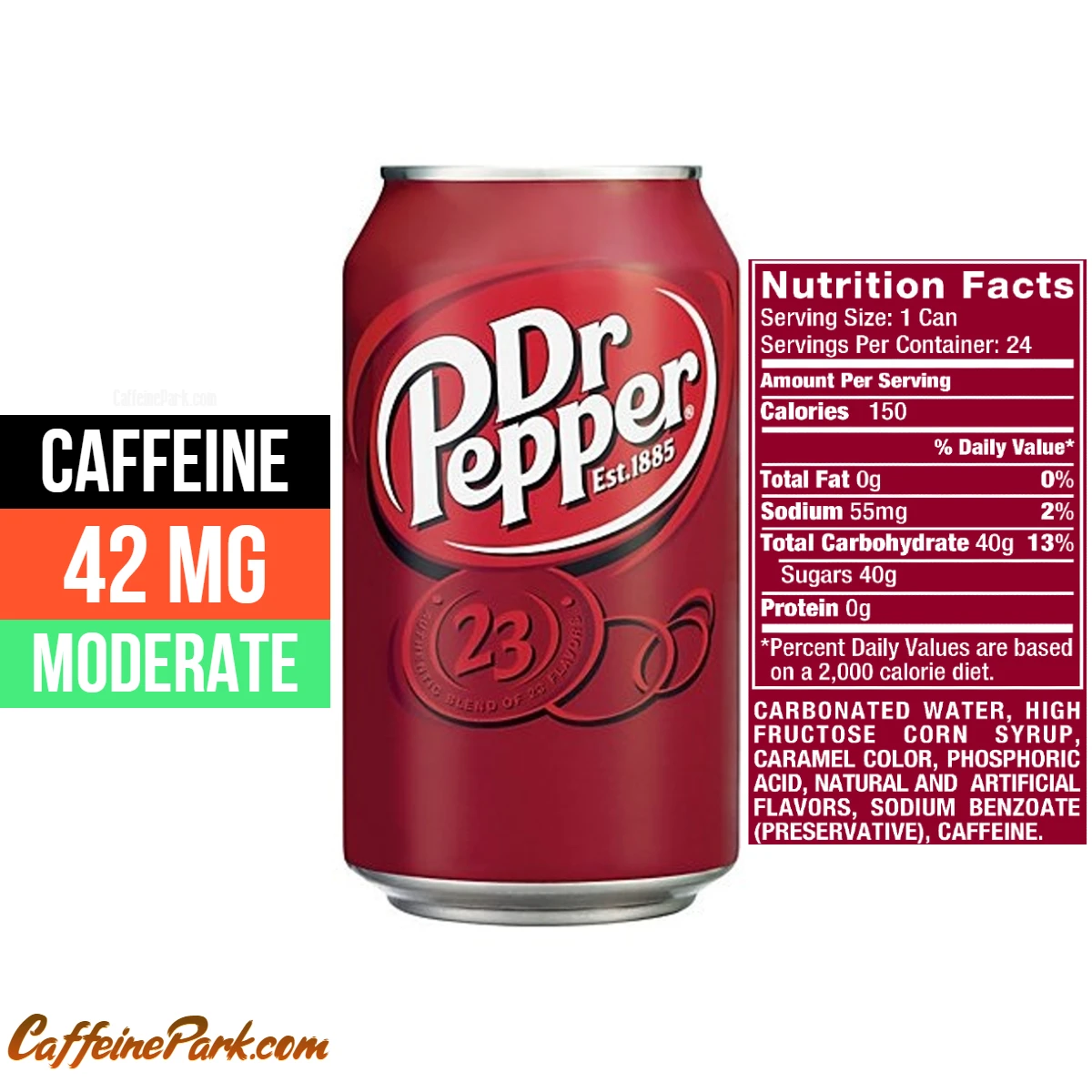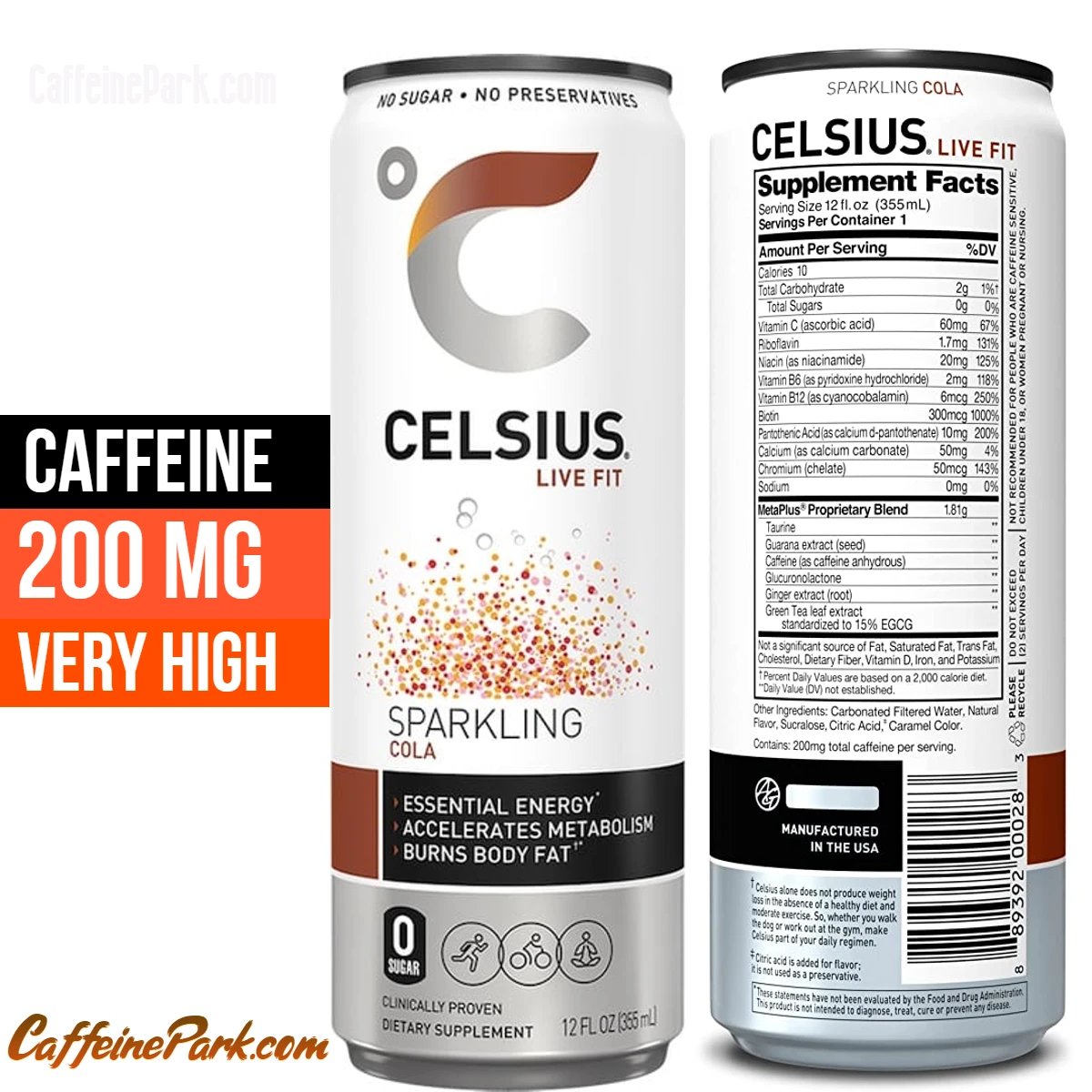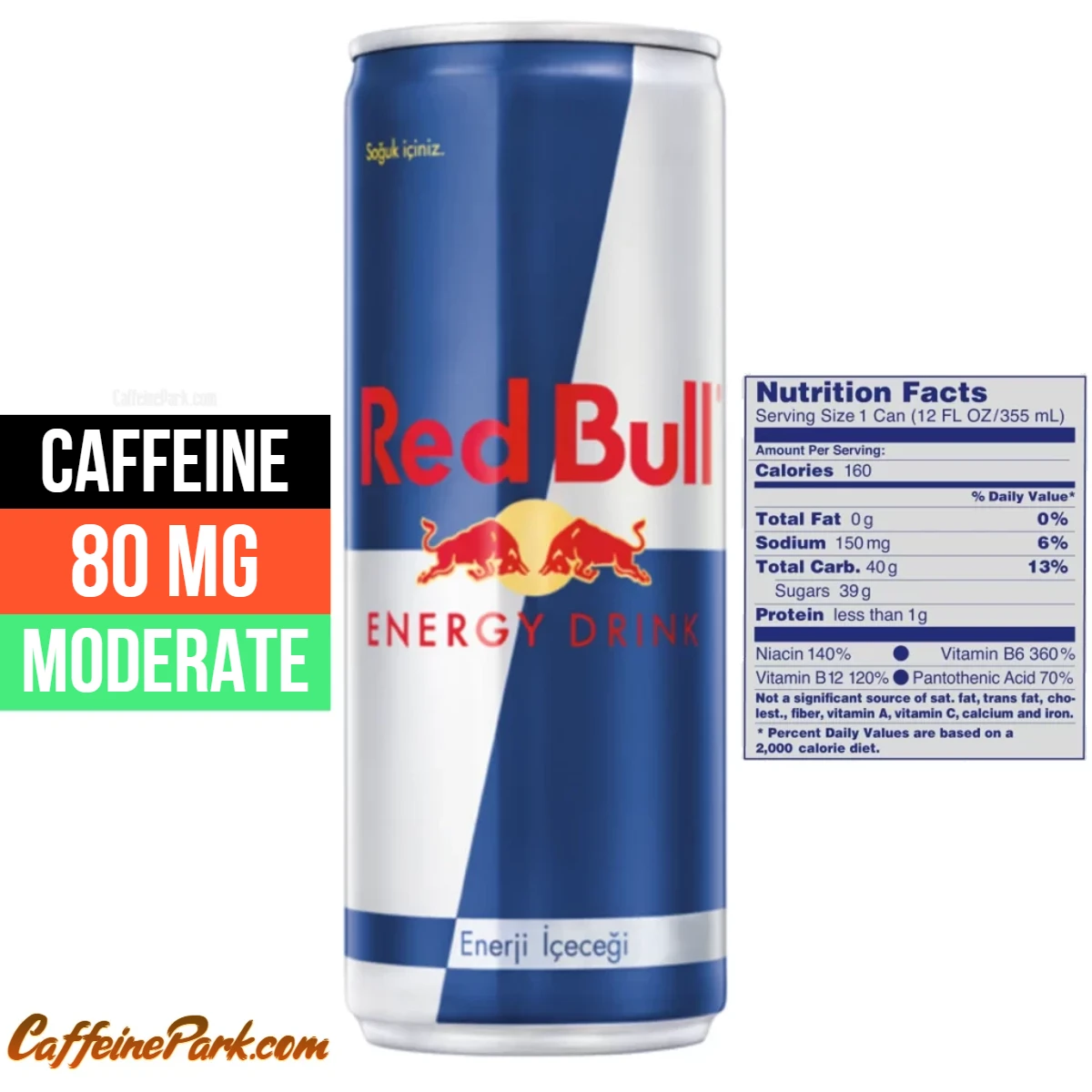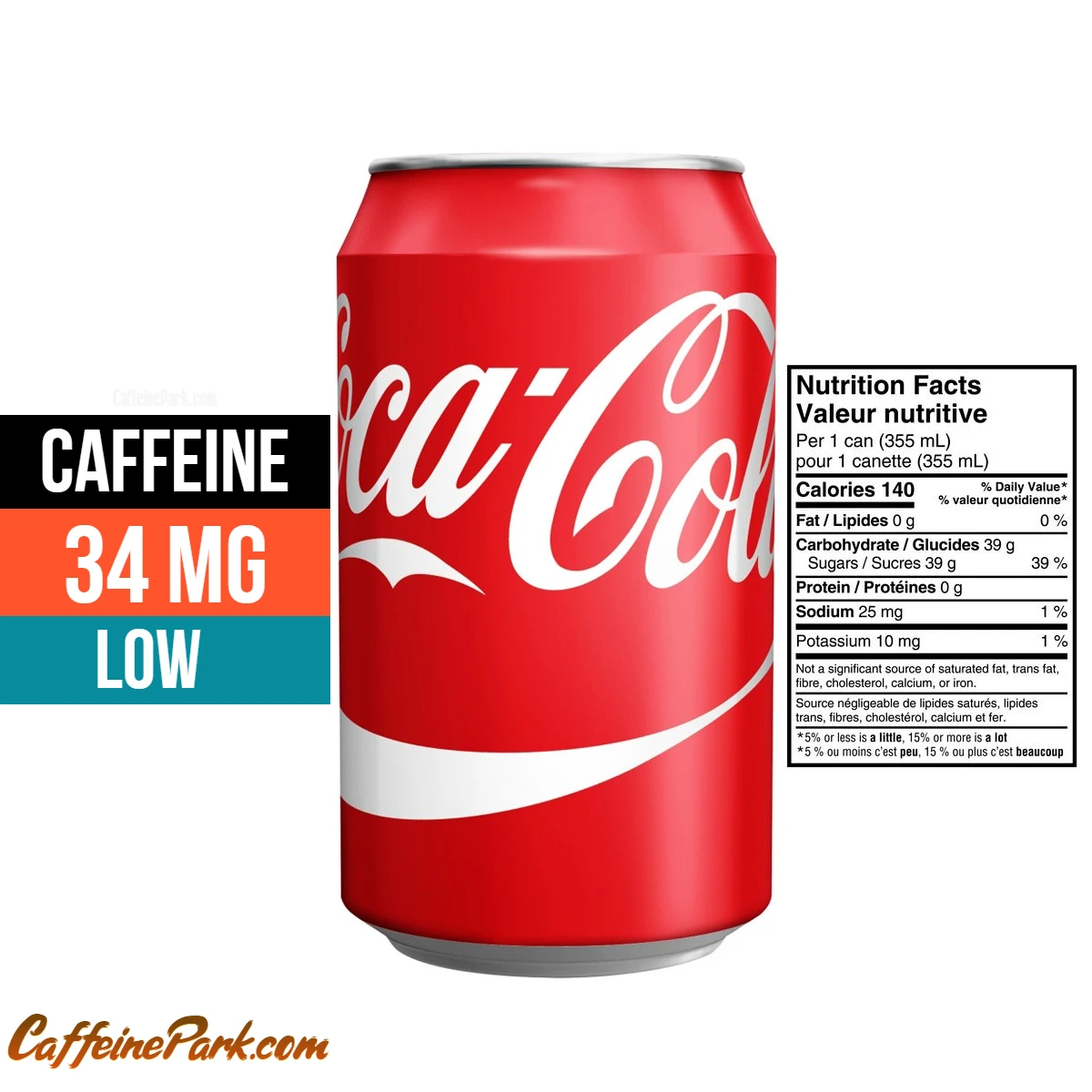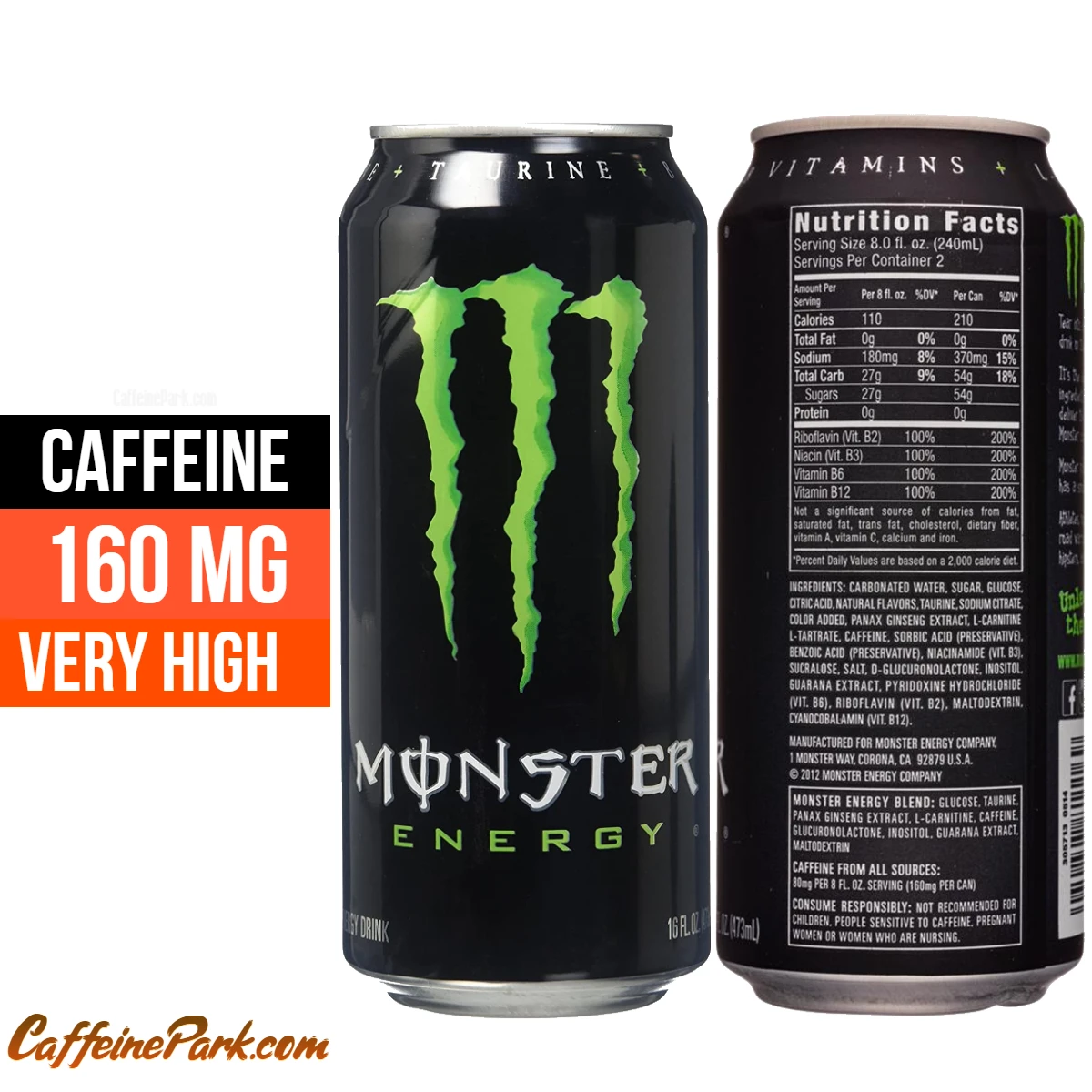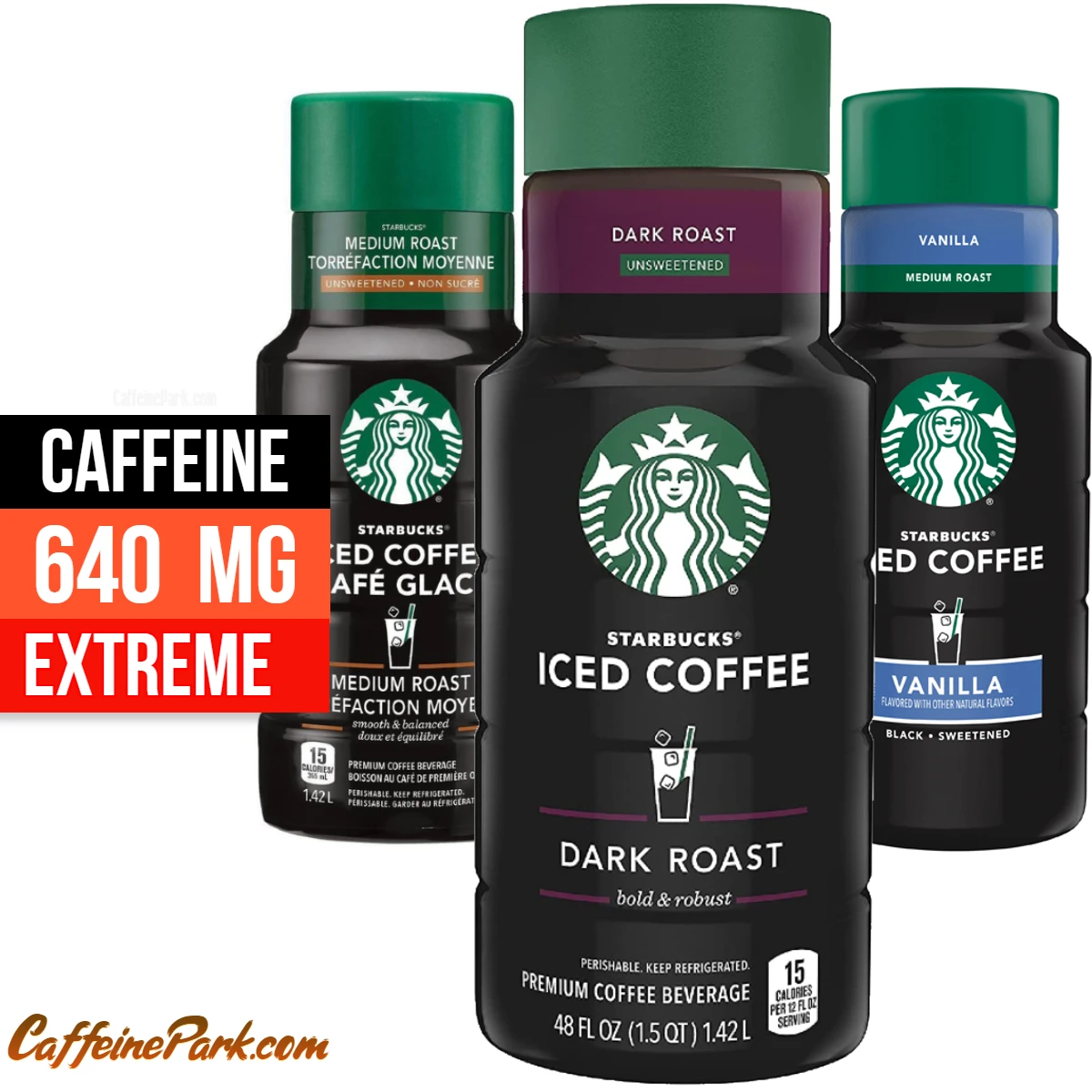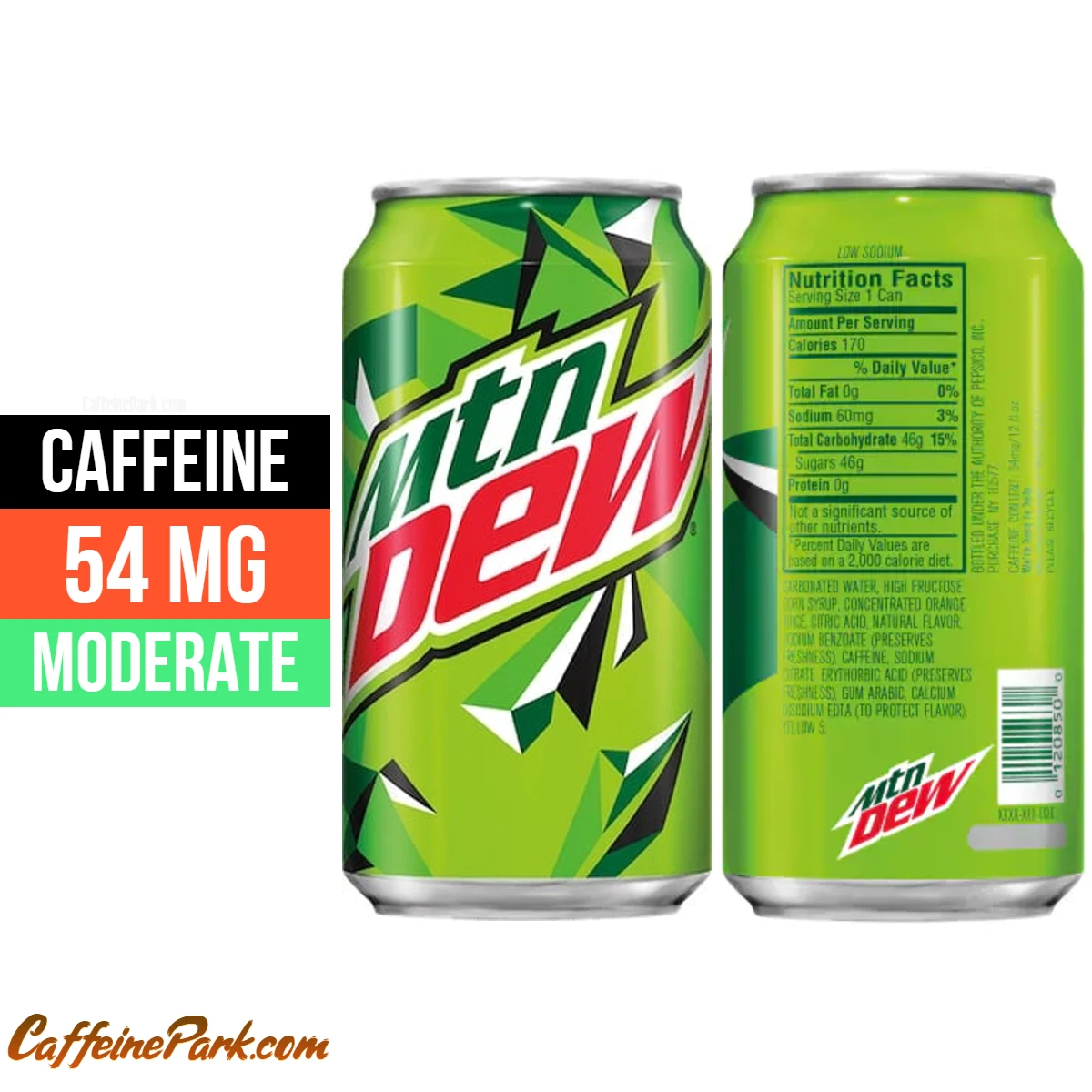
Mountain Dew is a popular brand of citrus-flavored, caffeinated soft drink that is produced and owned by PepsiCo. The original formula for Mountain Dew was created in the 1940s by Tennessee beverage bottlers Barney and Ally Hartman. The Hartman brothers marketed the drink to rural communities in the eastern and southern United States, where it quickly gained a cult following.
Over the years, Mountain Dew has undergone several formula and branding changes, and it is now available in various flavors and forms, including regular Mountain Dew, Diet Mountain Dew, Mountain Dew Code Red, Mountain Dew LiveWire, and Mountain Dew Pitch Black.
Mountain Dew contains caffeine, which is a stimulant that occurs naturally in the leaves, seeds, and fruit of some plants. Caffeine is also added to many foods and beverages, including soft drinks, coffee, tea, and chocolate, to help improve mental alertness and physical performance.
The caffeine content of Mountain Dew varies depending on the specific product and serving size. According to the Mountain Dew website, a 12-ounce (355-milliliter) serving of regular Mountain Dew contains 54 milligrams of caffeine. This is slightly more than the caffeine content of a 12-ounce serving of Coca-Cola, which contains about 34 milligrams of caffeine.
Does Mountain Dew have caffeine?
Yes, Mountain Dew contains 54mg of caffeine per 12 fl oz can and 4.5mg of caffeine per fl oz (15.22mg per 100ml).
| Serving size | Caffeine | Calories | Caffeine strength |
|---|---|---|---|
| 100ml | 15.2 mg | 47.9 | LOW |
| 8 fl oz can (230ml) | 36 mg | 113.3 | LOW |
| 12 fl oz can (355ml) | 54 mg | 170 | MODERATE |
- Caffeine Amount: 54 mg
- Caffeine strength: MODERATE
- Calories: 170
- Serving size: 12 fl oz can
- Sugar: 46g
Caffeine in Mountain Dew flavors
The caffeine content of Mountain Dew varies depending on the specific flavor and serving size. Here is a summary of the caffeine content of some popular Mountain Dew flavors:
| Mountain Dew flavors | Serving Size | Caffeine |
|---|---|---|
| Mountain Dew | 12fl oz | 54mg |
| Mountain Dew Spark | 12fl oz | 46mg |
| Diet Mountain Dew | 12fl oz | 54mg |
| Mountain Dew Zero Sugar | 12fl oz | 68mg |
| Mountain Dew Baja Blast | 12fl oz | 54mg |
| Mountain Dew Live Wire | 12fl oz | 54mg |
| Mountain Dew Major Melon | 12fl oz | 55mg |
| Mountain Dew Voltage | 12fl oz | 55mg |
| Mountain Dew Code Red | 12fl oz | 54mg |
| Mountain Dew Game Fuel | 16fl oz | 90mg |
| Mountain Dew Kickstart | 16fl oz | 90mg |
| Mountain Dew Amp | 16fl oz | 142mg |
| Mountain Dew Rise | 16fl oz | 180mg |
It is important to note that the caffeine content of Mountain Dew may vary slightly depending on the specific product and serving size. It is also important to be aware of your overall caffeine intake and to consume caffeine in moderation to avoid negative health effects.
Compare Caffeine in Mountain Dew vs Other Beverages
| Beverage | Serving Size | Caffeine |
|---|---|---|
| Mountain Dew | 12 fl. oz. | 54mg |
| Sun Drop | 12 fl. oz. | 64mg |
| Coca-Cola | 12 fl. oz. | 34mg |
| Pepsi | 12 fl. oz. | 38mg |
| Sprite | 12 fl. oz. | 0mg |
| 7 Up | 12 fl. oz. | 0mg |
| Fresca | 12 fl. oz. | 0mg |
| Dr Pepper | 12 fl. oz. | 42mg |
| Red Bull | 12 fl. oz. | 114mg |
| Monster Energy | 12 fl. oz. | 120mg |
| Coffee | 12 fl. oz. | 144mg |
Mountain Dew flavors and varieties
Mountain Dew was first introduced in 1940 as a lemonade-flavored soda. Since then, there have been many different flavors including Baja Blast, LiveWire, White Out, and more.
| Name | Dates of production |
|---|---|
| Mountain Dew | 1940–present |
| Diet Mountain Dew | 1988–present |
| Caffeine-Free Mountain Dew | 1976–present (standard)1989–present (diet) |
| Mountain Dew Real Sugar | 2009–present |
| Mountain Dew Baja Blast | 2004–present (fountain, exclusive to Taco Bell)2014-2016, 2018-2021 (retail, limited time release) |
| Mountain Dew Code Red | 2001–present |
| Mountain Dew LiveWire | 2003–present |
| Mountain Dew Voltage | 2008–present |
| Mountain Dew Major Melon | 2021–present |
| Mountain Dew Spark | 2020, 2021 (limited time release, exclusive to Speedway)2022-present |
| Mountain Dew White Out | 2010–present |
| Mountain Dew Goji Citrus Strawberry | 2017–present |
| Mountain Dew Berry Monsoon | 2018–present |
| Mountain Dew Sweet Lightning | 2019–present |
| Mountain Dew Maui Burst | 2019–present |
| Mountain Dew Frost Bite | 2020–present |
| Mountain Dew Atomic Blue | 2020–present |
| Mountain Dew Southern Shock | 2020–present |
| Dewgarita | 2020–present |
| Mountain Dew Vibe | 2021-present |
| Mountain Dew Thrashed Apple | 2021–present |
| Mountain Dew Uproar | 2021–present |
| Mountain Dew Dark Berry Bash | 2021-present |
| Mountain Dew Legend | 2022–present |
| Mountain Dew Kickstart Orange Citrus | 2013–present |
| Mountain Dew Kickstart Fruit Punch | 2013–present |
| Mountain Dew Kickstart Black Cherry | 2014–present |
| Mountain Dew Kickstart Limeade | 2014-2017 |
| Mountain Dew Kickstart Pineapple Orange Mango | 2015–present |
| Mountain Dew Kickstart Blood Orange | 2016–2019 |
| Mountain Dew Kickstart Hydrating Watermelon | 2016–2019 |
| Mountain Dew Kickstart Blueberry Pomegranate | 2016–2021 |
| Mountain Dew Kickstart Midnight Grape | 2016–present |
| Mountain Dew Kickstart Raspberry Citrus | 2017–2021 |
| Mountain Dew Kickstart Mango Lime | 2017–2021 |
| Mountain Dew Kickstart Original | 2018–2019 |
| Mountain Dew Kickstart Ultra | 2018–2019 |
Ingredients in Mountain Dew
The ingredients in Mountain Dew vary depending on the specific flavor. The ingredients listed on a can of regular Mountain Dew are:
- Carbonated water
- High fructose corn syrup
- Concentrated orange juice
- Citric acid
- Natural flavor
- Sodium benzoate (preservative)
- Caffeine
- Sodium citrate
- Erythorbic acid
- Gum arabic
- Calcium disodium EDTA
- Brominated vegetable oil
The ingredients in other flavors of Mountain Dew may vary slightly. It is important to be aware of the ingredients in Mountain Dew and to read labels carefully if you have allergies or dietary restrictions.
FAQs
Mountain Dew contains 54mg of caffeine per 12 fl oz can or 4.5mg per fl oz (15.22mg per 100ml).
Yes, Mountain Dew has a relatively high caffeine content compared to other soft drinks. With 54mg of caffeine per 12 fl oz can, it provides a noticeable energy boost.
Yes, Mountain Dew generally has a higher caffeine content compared to many other sodas. The exact caffeine content can vary among different brands and flavors of soda.
No, Mountain Dew typically has less caffeine than a typical cup of coffee. Coffee usually contains around 95mg to 165mg of caffeine per 8 fl oz, whereas Mountain Dew has 54mg of caffeine per 12 fl oz can.
The caffeine content in Mountain Dew may affect individuals differently. If you are particularly sensitive to caffeine or prefer to avoid it in the evening, it’s advisable to consume Mountain Dew in moderation or choose caffeine-free alternatives.
Yes, Mountain Dew also offers a caffeine-free variant for those who want to enjoy the taste of Mountain Dew without any caffeine content.
Mountain Dew is not recommended for children due to its caffeine content. It’s advisable to consider age-appropriate alternatives or choose non-caffeinated beverages specifically designed for children.
Is Mountain Dew bad for your health?
Mountain Dew, like any caffeinated beverage, should be consumed in moderation as part of a well-balanced diet. Caffeine is generally considered safe for most adults when consumed in moderation. Moderate caffeine intake is defined as up to 400 milligrams per day for adults, or about four to five cups of coffee.
However, consuming too much caffeine can lead to negative effects on the body, such as insomnia, anxiety, irritability, and increased heart rate and blood pressure. Caffeine can also interfere with the absorption of certain medications and can cause withdrawal symptoms if consumed in large amounts and then suddenly stopped.
In addition to caffeine, Mountain Dew contains other ingredients that may have negative effects on health if consumed in excess. For example, Mountain Dew contains high levels of sugar, which can contribute to tooth decay and weight gain if consumed in large amounts. It is important to consume Mountain Dew in moderation and to be aware of your overall caffeine and sugar intake.
Can Mountain Dew cause heart palpitations?
Consuming too much caffeine can lead to negative effects on the body, including increased heart rate and blood pressure, which can sometimes cause heart palpitations. Heart palpitations are feelings of rapid or irregular heartbeat that may be accompanied by a sensation of fluttering or pounding in the chest.
If you are experiencing heart palpitations after consuming Mountain Dew or other caffeinated beverages, it is important to monitor your caffeine intake and to talk to your healthcare provider if the palpitations persist or are accompanied by other symptoms.
It is important to note that the effects of caffeine can vary from person to person, depending on factors such as age, weight, and individual tolerance. Some people may be more sensitive to the effects of caffeine than others and may experience negative effects at lower levels of caffeine intake.
Is Mountain Dew bad for your teeth?
Mountain Dew and other sugary beverages can be harmful to teeth if consumed in large amounts. The sugar in these beverages can interact with bacteria in the mouth to form acid, which can attack and weaken tooth enamel. Over time, this can lead to tooth decay and cavities.
In addition to sugar, Mountain Dew contains other ingredients that may have negative effects on oral health. For example, the citric acid in Mountain Dew can erode tooth enamel and cause sensitivity. The artificial sweeteners used in Diet Mountain Dew may also have negative effects on oral health.
To protect your oral health, it is important to consume sugary beverages in moderation and to practice good oral hygiene habits, such as brushing your teeth twice a day and flossing daily. It is also important to see your dentist regularly for cleanings and checkups.
Can Mountain Dew cause sleep problems?
Caffeine is a stimulant that can interfere with sleep by disrupting the body’s natural sleep-wake cycle. Caffeine can stay in the body for several hours after it is consumed, and can have a stimulating effect on the brain and nervous system.
Consuming caffeine close to bedtime can make it harder to fall asleep and may lead to sleep problems, such as insomnia. The effects of caffeine on sleep can vary from person to person, depending on factors such as age, weight, and individual tolerance. Some people may be more sensitive to the effects of caffeine than others, and may experience sleep problems at lower levels of caffeine intake.
If you are experiencing sleep problems after consuming Mountain Dew or other caffeinated beverages, it is important to monitor your caffeine intake and to talk to your healthcare provider if the sleep problems persist. Your provider can help to determine the cause of your sleep problems and recommend appropriate treatment.
It is also important to note that other ingredients in Mountain Dew, such as sugar and artificial sweeteners, may contribute to sleep problems. Consuming large amounts of sugar or artificial sweeteners can lead to blood sugar spikes and crashes, which may disrupt sleep.
Can Mountain Dew cause weight gain?
Mountain Dew and other sugary beverages can contribute to weight gain if consumed in large amounts. The sugar in these beverages provides empty calories that can add up quickly, leading to weight gain if not balanced with physical activity.
A 12-ounce (355-milliliter) serving of regular Mountain Dew contains about 46 grams of sugar, which is equivalent to about 11.5 teaspoons of sugar. This is a significant portion of the recommended daily intake of added sugars, which is 50 grams (12.5 teaspoons) for men and 25 grams (6 teaspoons) for women.
In addition to sugar, Mountain Dew contains other ingredients that may have negative effects on weight, such as caffeine and artificial sweeteners. Caffeine can interfere with sleep and may increase the risk of weight gain if consumed in large amounts, while artificial sweeteners may have other negative effects on weight and metabolism.
To maintain a healthy weight, it is important to consume sugary beverages in moderation and to be mindful of your overall caloric intake. It is also important to engage in regular physical activity and to follow a well-balanced diet.
Can Mountain Dew cause diabetes?
Mountain Dew and other sugary beverages have been suggested as a potential cause of type 2 diabetes in some people. Type 2 diabetes is a chronic condition that occurs when the body becomes resistant to the effects of insulin or is unable to produce enough insulin to regulate blood sugar levels.
The sugar in sugary beverages can contribute to the development of type 2 diabetes if consumed in large amounts. Consuming large amounts of sugar can lead to blood sugar spikes and crashes, which can interfere with insulin function and increase the risk of type 2 diabetes.
However, the evidence on the link between Mountain Dew and type 2 diabetes is mixed, and more research is needed to confirm this relationship. It is also important to note that other factors, such as genetics, diet, and physical activity, may contribute to the development of type 2 diabetes.
If you are at risk of developing type 2 diabetes, it is important to be mindful of your sugar intake and to follow a healthy lifestyle, including regular physical activity and a well-balanced diet.
Can Mountain Dew cause kidney damage?
Mountain Dew and other caffeinated beverages have been suggested as a potential cause of kidney damage in some people. Caffeine has been shown to increase the excretion of calcium and other substances in the urine, which may increase the risk of kidney stones and other kidney problems in some people.
However, the evidence on the link between Mountain Dew and kidney damage is mixed, and more research is needed to confirm this relationship. It is also important to note that other factors, such as genetics, diet, and fluid intake, may contribute to the development of kidney problems.
If you are concerned about the effects of Mountain Dew on your kidneys, it is important to talk to your healthcare provider. Your provider can help to determine the cause of any kidney problems you may be experiencing and recommend the appropriate treatment.
Can Mountain Dew cause cancer?
There has been some concern that the ingredients in Mountain Dew and other caffeinated beverages may increase the risk of cancer. However, the evidence on this topic is mixed and more research is needed to confirm any potential link between these beverages and cancer.
One of the ingredients in Mountain Dew that has been the subject of controversy is the artificial sweetener known as sodium benzoate. Some studies have suggested that sodium benzoate, when combined with ascorbic acid (vitamin C), may form benzene, a known carcinogen. However, the levels of benzene that may be formed in Mountain Dew and other beverages are generally considered to be low and safe.
It is also important to note that other factors, such as genetics, diet, and lifestyle, may play a role in the development of cancer. If you are concerned about the potential effects of Mountain Dew and other caffeinated beverages on your health, it is important to talk to your healthcare provider.
How does Mountain Dew affect the body?
Mountain Dew and other caffeinated beverages can have both positive and negative effects on the body, depending on the amount consumed and the individual’s sensitivity to caffeine.
Some potential effects of Mountain Dew on the body include:
- Improved mental alertness: Caffeine, the main active ingredient in Mountain Dew, is a stimulant that can improve mental alertness and concentration.
- Increased physical performance: Caffeine can also improve physical performance by increasing endurance and reducing fatigue.
- Increased heart rate and blood pressure: Consuming large amounts of caffeine can lead to an increase in heart rate and blood pressure, which can be harmful for people with certain medical conditions.
- Insomnia: Caffeine can interfere with sleep, making it harder to fall asleep and leading to insomnia in some people.
- Anxiety and irritability: Consuming too much caffeine can cause anxiety and irritability in some people.
- Digestive problems: Caffeine can stimulate the production of stomach acid, which can lead to digestive problems such as acid reflux in some people.
Does Mt Dew have more caffeine than coffee?
The caffeine content of Mountain Dew and coffee varies depending on the specific product and serving size. In general, coffee contains more caffeine than Mountain Dew.
A 12-ounce (355-milliliter) serving of regular Mountain Dew contains about 54 milligrams of caffeine, while a typical 8-ounce (240-milliliter) serving of coffee contains about 80-100 milligrams of caffeine. However, the caffeine content of coffee can vary widely depending on the type of coffee beans, the roast level, and the brewing method. Some types of coffee, such as espresso, can contain significantly more caffeine than regular drip coffee.
It is important to note that the caffeine content of Mountain Dew and coffee can vary widely depending on the specific product and serving size. It is also important to be aware of your overall caffeine intake and to consume caffeine in moderation to avoid negative health effects.
Read More:
- Does Green Tea have Caffeine?
- Does Kin Spritz have Caffeine?
- Does Fanta have Caffeine?
- Dr Pepper vs Mountain Dew
- 7Up vs Mountain Dew
- Mountain Dew vs Sierra Mist
- Fanta vs Mountain Dew
- Mountain Dew vs Red Bull
- Mountain Dew vs Pepsi
- Diet Mountain Dew vs Mountain Dew Zero
- Ale 8 1 vs Mountain Dew
- Mountain Dew vs Coke
- Mountain Dew vs Sprite
Contents
- Does Mountain Dew have caffeine?
- Caffeine in Mountain Dew flavors
- Compare Caffeine in Mountain Dew vs Other Beverages
- Mountain Dew flavors and varieties
- Ingredients in Mountain Dew
- FAQs
- Is Mountain Dew bad for your health?
- Can Mountain Dew cause heart palpitations?
- Is Mountain Dew bad for your teeth?
- Can Mountain Dew cause sleep problems?
- Can Mountain Dew cause weight gain?
- Can Mountain Dew cause diabetes?
- Can Mountain Dew cause kidney damage?
- Can Mountain Dew cause cancer?
- How does Mountain Dew affect the body?
- Does Mt Dew have more caffeine than coffee?
